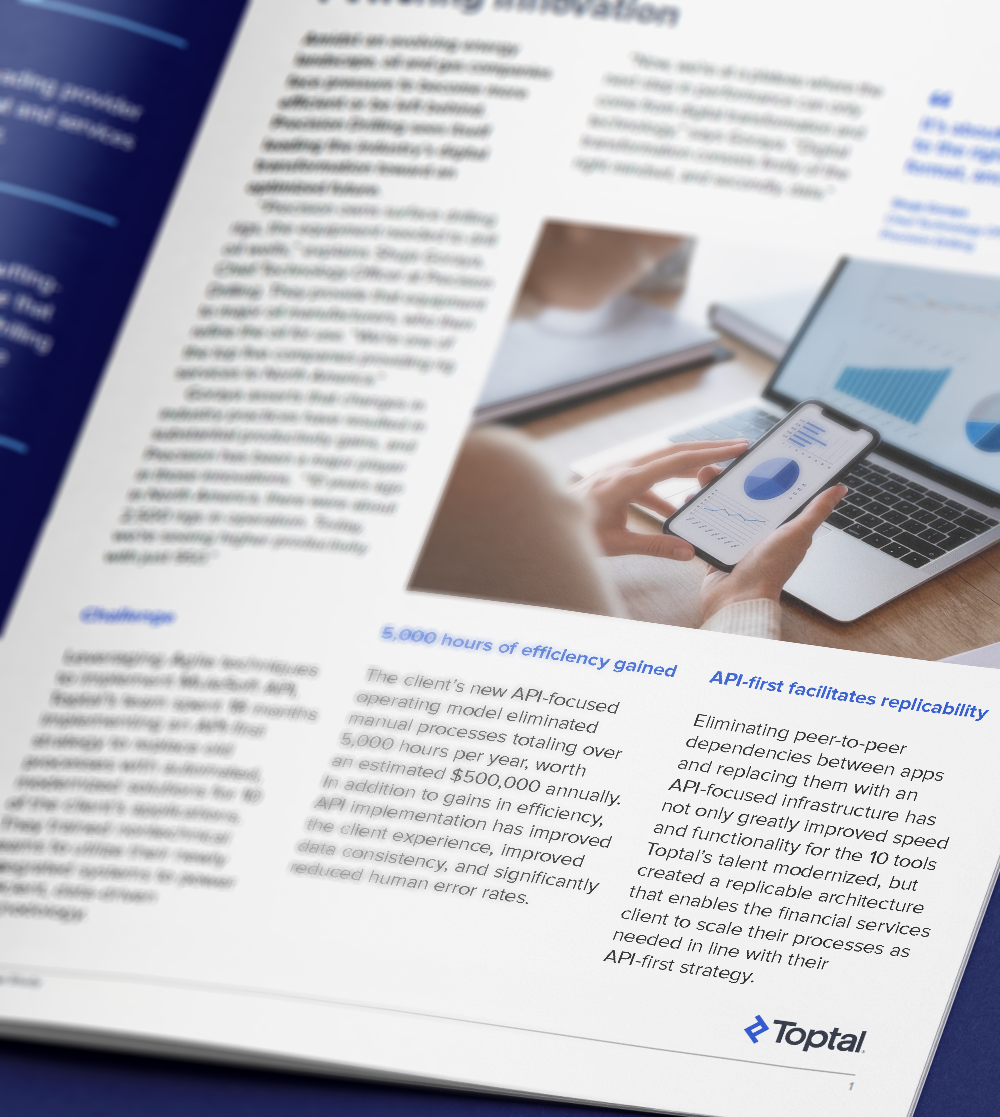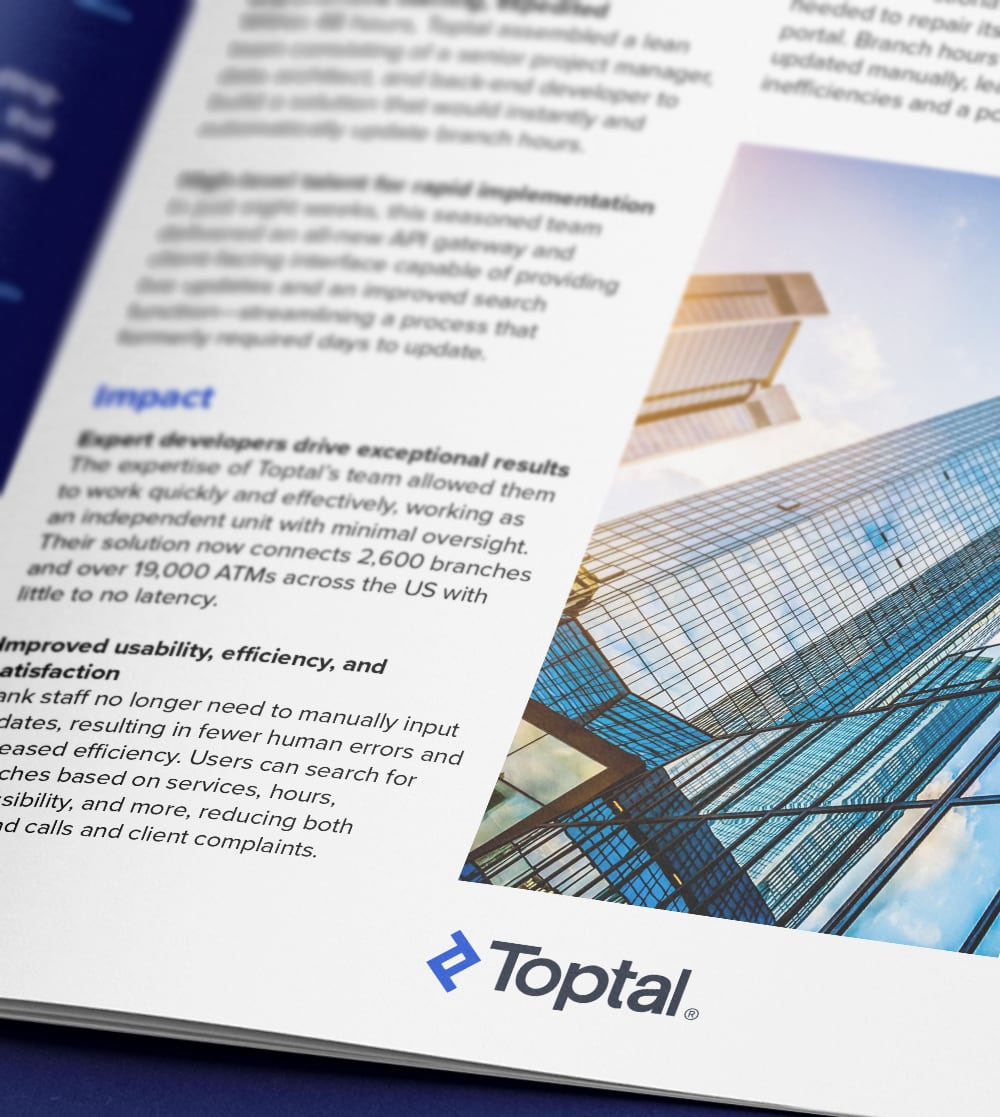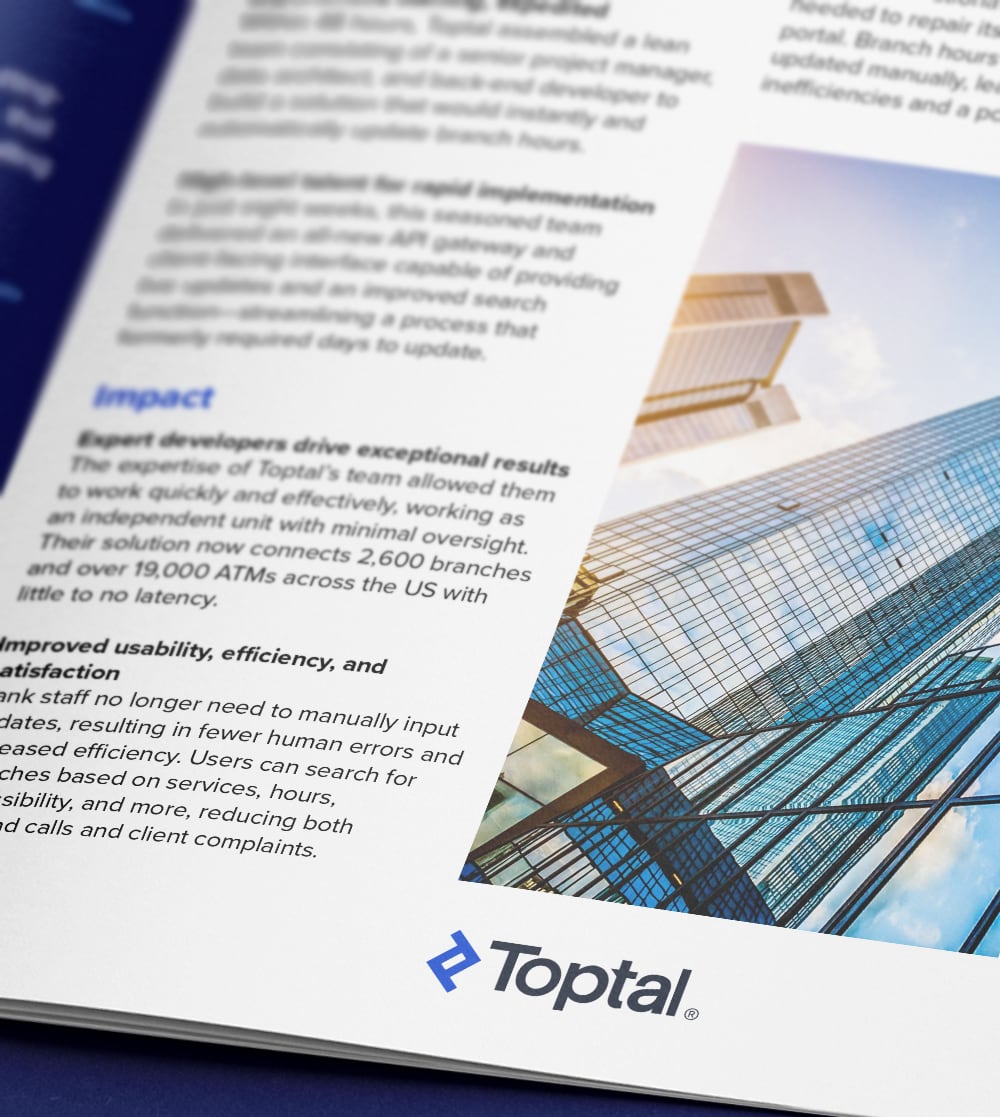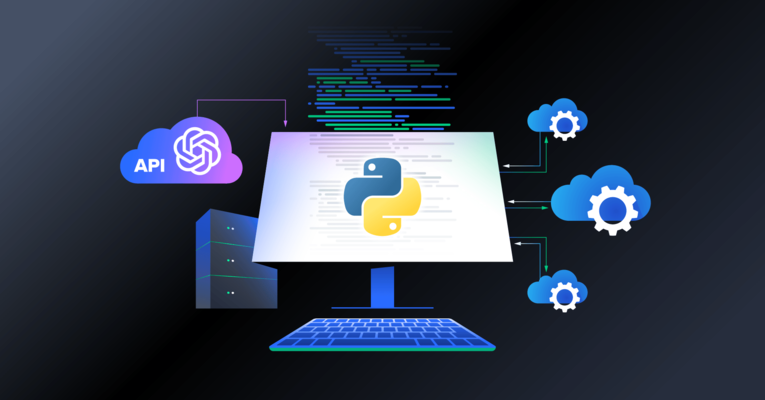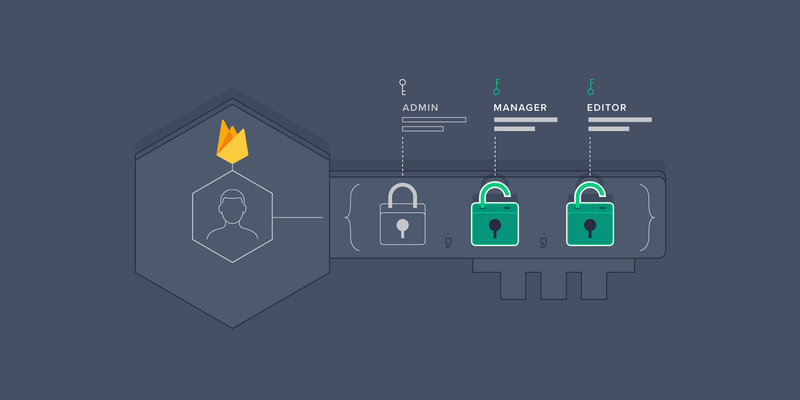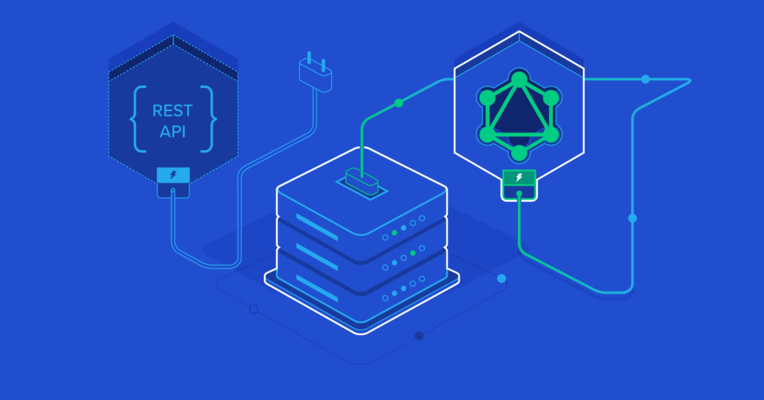
Hire API Developers
Hire the Top 3% of Freelance API Developers
Hire API developers, engineers, and programmers on demand. Top companies and startups choose API developers from Toptal for RESTful services, GraphQL, third-party integrations, API security, and more.
No-Risk Trial, Pay Only If Satisfied.
Hire Freelance API Developers
Erez Nassimi
Erez has 30 years of experience in software development and 15 years in team building and management. His expertise covers multiple languages (C++, C#, Pascal, SQL), frameworks (.NET), paradigms (OOP, REST), platforms (Windows), protocols (Diameter, FIX), including API development, design patterns, web scraping, and clean coding. Familiar with stock options, currency exchanges, and trading/algo-trading, he has won innovation awards at Amdocs, contributing to CodeProject and StackOverflow.
Show MoreSatish Babu Dakudora
Satish is an adaptable and technically strong professional with a customer business value-add mindset and several years of experience in quality assurance for companies like Deloitte and Consensys. While Satish specializes in Selenium, Cypress, and API testing, he's also comfortable building automation test frameworks and recently led the technical portfolio for an automation project.
Show MoreClaudio Nazzari
Claudio has over 20 years of software development experience and a cybersecurity degree. He has handled back-end, front-end, and full-stack development, DevSecOps, application security, penetration testing, and solutions architecture. With his combined expertise, Claudio focuses on helping companies by developing and architecting secure and resilient web and mobile applications.
Show MoreAnne Adams
Anne is an experienced developer who has worked both for large corporations and startups. After building financial trading applications for eight years as an engineer at Merrill Lynch, Anne founded and built LoudUp, a music-based social network that she designed, developed, and launched from the ground up. She specializes in .NET technologies and JavaScript.
Show MoreSreeram Kartheek Vennapusa
Sreeram is an automation lead with 12 years of experience designing, developing, testing, and maintaining eCommerce, CRM, and web apps. He has a solid background in working in fast-paced environments, understanding business requirements, and automating accordingly. Sreeram analyzed Software Architecture Documents (SAD) and use case documents and developed test strategy documents. He has hands-on knowledge of continuous integration tools like Jenkins, Git, AWS, and Docker.
Show MoreGaurav Garg
Gaurav is a 9x Salesforce certified professionl with over 10 years of experience within Salesforce and project delivery. He's proficient in Lightning Web Component (LWC) and Salesforce Lightning and Classic. Being proficient in code design patterns for scenarios and process-based structures, Gaurav designed schema structures to handle eCommerce, manufacturing, and insurance industry processes. He led an API structure model deisgn that brought low maintenance and scalability to a project.
Show MorePankaj Batra
Pankaj is a hands-on professional and entrepreneur with 20+ years of experience in product development, planning, architecture and design, team building, and business leadership. He has led teams in the business-growth phase across enterprise software, advertising, B2B SaaS, education, personal finance, food tech, and logistics. Pankaj's specialties include database design, API development, product management, and back-end development in Ruby on Rails, Java, SQL, and AWS.
Show MoreMarco Sanabria
Marco is a passionate SDET who always looks for solutions that automate manual processes in the development lifecycle. With over a decade of experience, he has worked on several projects, performing as a QA automation engineer, tech lead, and coach. Marco has conducted testing in several layers of modern web applications, including UI, API, and performance. He has also led teams developing QA strategies from the ground up.
Show MoreDmitry Pavlov
Dmitry is a top-notch developer with 20+ years of experience creating .NET web applications. These days, he mainly deals with ASP.NET Core and Blazor (C# and .NET Core) software development and architecture design. Known to clients as "the coding machine," Dmitry is a 9-time recipient of the Microsoft MVP Award for developer technologies and is a capable community leader. He has a Master of Science degree in computer science and a PhD in geology.
Show MoreHemant Talele
Hemant is a seasoned MuleSoft architect/SME and senior developer with 17+ years of software project experience and specialization in the MuleSoft Anypoint platform. He has extensive work experience working with international (US, Canada, and UK) clients on software projects. Hemant is a self-starter who is able to work independently or in a team with limited supervision and great efficiency. He has worked with many clients to formulate solutions customized to their needs.
Show MoreJulien Loutre
Julien is a professional software engineer with 15+ years of experience. A former team leader and user operations analyst at Facebook as well as a former project manager, he is also the co-founder and CTO of a trivia company with 280+ thousand players and $1+ million in annual revenue. Julien specializes in scalable AWS Node.js microservices but also has years of experience as a full-stack engineer with 7+ years of experience with AngularJS.
Show MoreDiscover More API Developers in the Toptal Network
Start HiringA Hiring Guide
Guide to Hiring a Great API Developer
API developers are experts in crafting virtual bridges that enable the smooth flow of data between disparate systems. This guide to hiring API developers features best practices for the hiring process, job description tips, and interview questions and answers that will help you identify the right candidates for your company.
Read Hiring Guide... allows corporations to quickly assemble teams that have the right skills for specific projects.

Despite accelerating demand for coders, Toptal prides itself on almost Ivy League-level vetting.









How to Hire API Engineers Through Toptal
Talk to One of Our Client Advisors
Work With Hand-selected Talent
The Right Fit, Guaranteed
EXCEPTIONAL TALENT
How We Source the Top 3% of API Developers
Our name “Toptal” comes from Top Talent—meaning we constantly strive to find and work with the best from around the world. Our rigorous screening process identifies experts in their domains who have passion and drive.
Of the thousands of applications Toptal sees each month, typically fewer than 3% are accepted.
Toptal API Case Studies
Discover how our API developers help the world’s top companies drive innovation at scale.
Capabilities of API Developers
Toptal’s developers specialize in designing and implementing high-quality APIs that allow efficient data exchange and seamless integration between applications.
Custom API Development
RESTful and GraphQL API Design
Event-driven Architecture With APIs
Microservices Architecture Integration
Third-party Integration
Real-time APIs and WebSockets
Security and Authentication
Performance Optimization
Versioning and Documentation
Monitoring and Analytics
FAQs
How much does it cost to hire an API developer?
The cost associated with hiring an API developer depends on various factors, including preferred talent location, complexity and size of the project you’re hiring for, seniority, engagement commitment (hourly, part-time, or full-time), and more. In the US, for example, Glassdoor’s reported average total annual pay for API developers is $125,000 as of August 2024. With Toptal, you can speak with an expert talent matcher who will help you understand the cost of talent with the right skills and seniority level for your needs. To get started, schedule a call with us — it’s free, and there’s no obligation to hire with Toptal.
How quickly can you hire with Toptal?
Typically, you can hire API developers with Toptal in about 48 hours. For larger teams of talent or Managed Delivery, timelines may vary. Our talent matchers are highly skilled in the same fields they’re matching in—they’re not recruiters or HR reps. They’ll work with you to understand your goals, technical needs, and team dynamics, and match you with ideal candidates from our vetted global talent network.
Once you select your API developer, you’ll have a no-risk trial period to ensure they’re the perfect fit. Our matching process has a 98% trial-to-hire rate, so you can rest assured that you’re getting the best fit every time.
How do I hire API developers?
To hire the right API engineer, it’s important to evaluate a candidate’s experience, technical skills, and communication skills. You’ll also want to consider the fit with your particular industry, company, and project. Toptal’s rigorous screening process ensures that every member of our network has excellent experience and skills, and our team will match you with the perfect API developers for your project.
How are Toptal API engineers different?
At Toptal, we thoroughly screen our API programmers to ensure we only match you with the highest caliber of talent. Of the more than 200,000 people who apply to join the Toptal network each year, fewer than 3% make the cut.
In addition to screening for industry-leading expertise, we also assess candidates’ language and interpersonal skills to ensure that you have a smooth working relationship.
When you hire API programmers with Toptal, you’ll always work with world-class, custom-matched API developers ready to help you achieve your goals.
Can you hire API programmers on an hourly basis or for project-based tasks?
You can hire API developers on an hourly, part-time, or full-time basis. Toptal can also manage the entire project from end-to-end with our Managed Delivery offering. Whether you hire a API developer for a full- or part-time position, you’ll have the control and flexibility to scale your team up or down as your needs evolve. Our API developers can fully integrate into your existing team for a seamless working experience.
What is the no-risk trial period for Toptal API developers?
We make sure that each engagement between you and your API developer begins with a trial period of up to two weeks. This means that you have time to confirm the engagement will be successful. If you’re completely satisfied with the results, we’ll bill you for the time and continue the engagement for as long as you’d like. If you’re not completely satisfied, you won’t be billed. From there, we can either part ways, or we can provide you with another API developer who may be a better fit and with whom we will begin a second, no-risk trial.
How to Hire API Developers
Gustavo is a startup founder and web developer with more than 17 years of experience specializing in API and web development. Well ahead of the advent of Zoom and Google Hangouts, he single-handedly created a video collaboration service that boasted a user base in more than 110 countries.
Expertise
Previously at

Demand for API Developers Continues to Expand
The application programming interface’s (API) role in ensuring seamless data interchange is the cornerstone of modern application frameworks in today’s interconnected digital ecosystem. As such, an experienced API developer is more than a mere coder: They serve as the vital liaison to ensure seamless communication between systems.
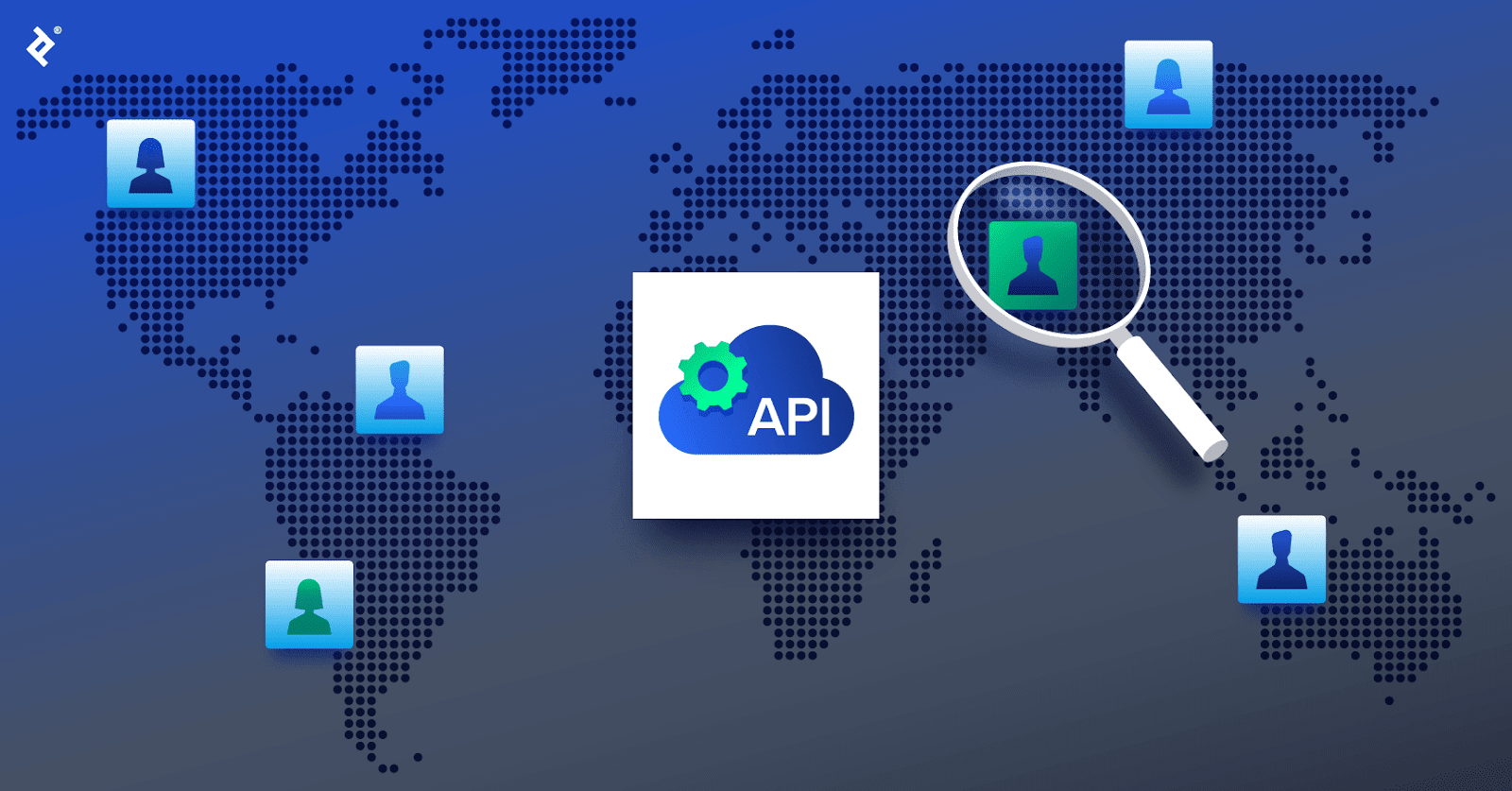
While software companies pioneered APIs, the adoption of API technology has become ubiquitous as non-software companies increasingly adopt API strategies. A trend driven by the need for data scalability and more straightforward coding solutions can be observed across various sectors that range from healthcare to financial services. This shift has led to a more prevalent API-first approach across industries. The API management market is projected to expand from $6.89 billion in 2025 to $32.77 billion by 2032, with a compound annual growth rate (CAGR) of 25.0% between 2025 and 2032. This growth stems from the need to use and scale company data more efficiently.
Moreover, the focus on secure API solutions underscores their crucial role in data transfer, emphasizing the need for a design-first approach to ensure robustness and scalability. As APIs become integral to digital transformation, they shape how businesses can enhance their customer experience and maintain a competitive edge in a digitalized world.
What Attributes Distinguish Quality API Developers From Others?
In the software development world, skilled API developers occupy a niche that demands technical prowess and a strategic mindset. While generalist software engineers can navigate the basics of API development, seasoned API developers stand out due to their strong understanding of API-first design practices and commitment to ensuring seamless integration. This makes them adaptable across a wide range of projects, which is crucial when vetting potential candidates to ensure they can help achieve your business goals.
However, hiring API developers isn’t straightforward. The specific requirements of the role (e.g., understanding API-first design principles, crafting efficient API requests, and building applications that communicate seamlessly across a variety of platforms) makes finding the right fit a challenge. But what exactly do API developers do?
API developers ensure seamless communication between systems, applications, and platforms. Their role encompasses:
App development and coding – API developers are responsible for crafting the back-end logic that enables smooth data flow. They write code that defines how software applications interact, ensuring efficient data retrieval, storage, and transmission, as well as a seamless user experience.
Problem-solving – In the dynamic world of APIs, challenges—whether optimizing data flow, ensuring security, or troubleshooting integration issues—are a given. An API developer’s day often involves leveraging their technical skills to identify and rectify problems to ensure uninterrupted service. This is a trait shared by all effective software developers as it is integral to a successful development process.
Application design and architecture – API developers are strategists who transcend mere coding. Embracing an API-first design approach, these programmers lay down the blueprints for how their APIs will be structured, ensuring scalability and maintainability. They seamlessly integrate APIs with other systems, such as databases, automation tools, third-party services, and other application layers, to ensure smooth and efficient communication across the entire software ecosystem.
Testing and quality assurance – To guarantee that an API can handle real-world demands and maintain data integrity, developers rigorously test their creations using various API testing tools, checking APIs for vulnerabilities, efficiency bottlenecks, and potential points of failure.
In essence, an API developer is both a technician and a strategist. They build, solve, design, and innovate. Their multifaceted role is instrumental in ensuring that applications don’t just work in isolation, but come together to offer integrated, efficient, and cohesive digital experiences.
Traits That Quality API Developers Exhibit
Having explored the fundamental expectations of the role, let’s now focus on what makes for an exceptional developer. Beyond a high proficiency in their technical domain, extraordinary API professionals bring a blend of expertise, foresight, and strategic thinking that sets them apart.
Deep understanding of API-first design – Top-tier API developers know far more than how to work with APIs. They think in terms of APIs, meaning that right from the inception of a project, they prioritize the API-first design approach. This ensures that APIs are the foundation upon which an app is built, not just an afterthought. This approach guarantees seamless integration, scalability, and maintainability.
Proficiency in multiple application frameworks – The best API developers are well versed in various application frameworks. Whether using representational state transfer (REST) API, SOAP, GraphQL, or gRPC, a quality developer has hands-on experience and can decide which framework best suits particular business requirements.
Mastery of API requests – Crafting efficient and secure API requests is crucial; exceptional developers understand the nuances of various request types, and they can structure these requests to ensure data integrity, speed, and security.
Experience with various applications – Quality API developers will have experience working with diverse applications. This experience provides insights into potential integration challenges and solutions, ensuring a streamlined process and smoother project execution.
Effective communication – Given the interconnected nature of their work, API developers often liaise with front-end and back-end teams, stakeholders, and third-party service providers. High-quality developers with effective collaboration and communication skills can clearly articulate complex technical details to nontechnical team members, ensuring all parties are aligned.
Continuous learning and adaptability – The tech landscape is ever-evolving: Top API developers are committed to continuous learning and staying abreast of the latest trends, tools, and best practices. This attribute often translates into adaptability, making these professionals ideally suited to handle changes in project requirements or technological shifts.
Understanding flexible hiring models – It is essential to recognize the benefits and limitations of the different hiring models, such as freelance, in-house, hybrid, or remote development. A quality API developer will adapt their collaboration style according to the dynamics of each model.
Team collaboration – API development services are typically a team endeavor. A top candidate needs to be able to work harmoniously within an API app development team, sharing knowledge, providing feedback, and collaborating on solutions.
Attention to security – With the ever-increasing threats in the digital space, a premium API developer always prioritizes security practices. They ensure that data transmitted through API requests is encrypted, authenticated, and authorized, safeguarding the integrity of the entire system.
Complementary Technology Skills for API Development
The various technologies supporting broader software development also bolster the API developer’s professional capabilities. While the core competencies of API design and integration remain pivotal, complementary technology skills equip engineers to tackle a broader range of challenges. These additional skills not only enhance their versatility, but also provide a holistic understanding of the end-to-end application ecosystem:
JavaScript and Node.js – At its core, JavaScript is an indispensable language for web development. In combination with its runtime environment, Node.js, JavaScript becomes a powerhouse for server-side scripting. Particularly popular for building RESTful APIs, Node.js offers asynchronous, event-driven architecture, making API responses swift and efficient.
Python – Admired for its simplicity, Python is a go-to language for many developers. Its versatility shines in API development, with frameworks like Flask offering lightweight solutions and Django providing a more comprehensive toolkit. These frameworks simplify the process of crafting robust and scalable APIs, showcasing the abilities of a skilled developer.
Java – A cornerstone of the enterprise-level application landscape, Java offers reliability and scalability. Leveraging frameworks like Spring, Java enables developers to craft efficient, secure, and modular APIs that cater to the complex needs of large-scale businesses.
Ruby – A formidable tool for API development—especially when paired with the Ruby on Rails framework—Ruby ensures that APIs are built in a streamlined and maintainable manner by emphasizing convention over configuration and the “don’t repeat yourself” principles.
JSON – APIs commonly use JSON (JavaScript Object Notation) as a response format. JSON is a lightweight data-interchange format that is easy to read and write and has been widely adopted in web services and RESTful APIs for data exchange.
AWS and/or Azure – These two cloud services platforms provide suites of services and tools that are widely used in the creation, deployment, and management of APIs, so a strong API developer candidate should be familiar with one or both. Less crucial but still helpful is knowledge of Google Cloud Platform.
SQL – Structured Query Language (SQL) is a standardized programming language used for managing and manipulating relational databases. SQL plays a significant role in API development, particularly when APIs interact with databases, so having experience with the language is useful for an API developer.
Version control – Version control systems—particularly Git—act as the backbone of the modern software development collaborative environment. Beyond tracking code changes, a version control system facilitates multiple developers working on the same project, ensuring code integrity and a unified development direction.
Web APIs and RESTful services – Grasping the principles of REST is paramount for any API developer. REST emphasizes stateless communication, scalability, and a uniform interface. An adept developer should be familiar with HTTP methods and the implications of various HTTP status codes, ensuring that their APIs are intuitive and adhere to best practices.
Database knowledge – APIs can bridge applications and databases. A developer’s understanding of databases helps effectively leverage APIs to facilitate data exchange between applications and databases. Whether it’s the structured query language of MySQL, the object-relational capabilities of PostgreSQL, or the document-oriented design of MongoDB, understanding the nuances of these systems ensures that data retrieval and storage are optimized.
Understanding REST API Development
REST (Representational State Transfer) API development involves building web APIs that adhere to REST principles, supporting scalable, stateless communication between clients and servers. Developers design and implement these APIs to allow seamless data exchange across systems.
Key Aspects of REST API Development
Effective REST API development relies on a few core principles that shape how systems interact and share information. These elements guide developers in building APIs that are logical, reliable, and easy to work with. The following concepts form the foundation of well-structured RESTful APIs:
Stateless Architecture – Each API request operates independently, without relying on stored server context. This simplifies scaling and improves system reliability.
Resource-Based Structure – REST uses URLs to represent resources, making endpoints predictable, organized, and intuitive to use.
HTTP Methods & Status Codes – CRUD operations (GET, POST, PUT, DELETE) align with HTTP methods, using standard response codes to indicate success or failure.
Authentication & Security – Secure APIs use protocols like OAuth, API keys, and JSON Web Tokens (JWT) to protect access and ensure data integrity.
Why hire a REST API developer?
Skilled REST API developers optimize API performance, maintain high security standards, and enable integration with third-party tools and platforms. Their adherence to best practices for versioning, documentation, and error handling ensures your APIs remain reliable and scalable over time.
How Can You Identify the Ideal API Developer for You?
Before you seek an API engineer for your project, you’ll need to identify a developer level that aligns with your needs. While it is possible to opt for an expert as a matter of course, this is not always necessary. A junior or mid-level developer might suffice if a project is straightforward, with well-defined parameters and limited challenges. However, an intricate project with potential pitfalls demands talent with more years of experience and demonstrated foresight, efficiency, and innovation. While they incur a greater initial investment, a senior API developer for hire can reduce project costs in the long run. An effective hiring process helps in discerning the right level of expertise needed.
Prepare a Problem Statement
To determine the appropriate developer level for your project, it’s paramount to define the skills gap they will fill. An effective way to begin is to compose a problem statement. Include details such as:
- The primary goal of the project.
- The project’s anticipated challenges.
- The project’s scale and complexity.
Once you’ve added these particulars to the problem statement, add specific details, such as tasks the developer will need to perform or manage. Also, consider whether the work will be performed full-time or if hiring a hybrid or remote API developer is possible. With the pertinent information organized, you are now ready to choose the level of your next API developer.
Choose a Developer Experience Level
Junior API Developer | Mid-level API Developer | Senior API Developer | |
|---|---|---|---|
Primary Attributes |
|
|
|
Optimal Fit |
|
|
|
Advantages | Choosing a junior API developer allows you to cultivate their professional growth in a manner that aligns with your organization’s practices and culture. | A mid-level API developer brings an impressive level of experience to the table without the premium price tag of an expert. | A senior API developer possesses invaluable expertise, foresight, and problem-solving skills, ensuring the project’s success and efficiency. |
What Are Some Common API Development Use Cases?
APIs, the unsung heroes of the digital realm, serve as the connective tissue between diverse applications, platforms, and devices. Let’s explore some common scenarios where API development plays a central role:
Web application development – APIs bridge the gap between front-end web applications and back-end servers. Through APIs, web applications fetch and dispatch data to the server, rendering dynamic, interactive user experiences.
Mobile app development – Mobile applications often depend on remote servers that provide data or specific functionalities. When expertly designed, APIs provide users with a seamless app experience by ensuring that communication is consistently smooth and efficient.
Third-party integrations – APIs expand apps’s capabilities by making connecting to social media networks, payment gateways, or cloud storage easy. Google API and Facebook API are commonly integrated for these purposes.
Microservices architecture – Within a microservices framework, APIs are a lifeline, enabling distinct services to collaborate, share data, and perform functions while retaining independence.
Internet of Things (IoT) connectivity – For IoT devices, APIs are the gateway to cloud platforms or apps, ensuring data flow and facilitating remote device management.
Data retrieval and aggregation – APIs are the tools that fetch and consolidate data from diverse sources, catering to analytical and business intelligence endeavors across a wide range of applications. These capabilities are essential for meeting business goals related to data-driven decision-making. Dedicated API developers ensure the reliability and efficiency of these processes.
Real-time data exchange – APIs are indispensable for applications like chat services or online games that demand real-time data relay.
Content management and publishing – Content-rich platforms often rely on APIs for programmatic content creation, updates, and retrieval.
Authentication and authorization – In the security domain, APIs are pivotal in executing robust authentication and resource access controls.
E-commerce and payments – For online shopping platforms, APIs are the link to payment gateways, ensuring secure transaction processing.
Geolocation and mapping services – Applications leveraging location-centric features tap into APIs provided by mapping services, enhancing the user experience.
Social media integration – APIs from social media giants power the integration of social functionalities, ranging from sharing to logins.
Chatbots and AI services – APIs open the doors to AI, enabling chatbot integration and functionalities like sentiment analysis.
Enterprise system integration – APIs unify disparate enterprise software—be it customer relationship management or enterprise resource planning systems—ensuring streamlined operations and data consistency.
Blockchain integration – For the avant-garde world of blockchain, APIs facilitate interactions, empowering developers to craft decentralized applications or manage cryptocurrency exchanges.
In essence, APIs are the backbone of diverse digital scenarios, from everyday app interactions to advanced enterprise integrations. Their omnipresence and versatility make APIs critical for shaping the modern digital experience.
What Skills Are Needed to Address These Common API Development Use Cases?
Understanding skill level distinctions and aligning these with project requirements moves you a step closer to identifying the ideal API developer for you. To ensure a successful collaboration and project execution, consider the following common use cases for API projects:
API Integration Across Platforms | Look for a developer with experience in diverse application frameworks and a proven track record of seamless integrations. |
Building From Scratch | If you’re starting a new project, prioritize developers who emphasize an API-first design approach. |
Maintenance and Upgrade Implementation | A developer who is well versed in your specific application frameworks is preferable. |
Security Enhancement | Given the critical nature of security, opt for an expert developer with a robust understanding of encryption, authentication, and authorization practices. |
Optimization of API Requests | If your application struggles with latency or data integrity issues, seek a developer proficient in crafting efficient API requests. |
How to Write an API Developer Job Description for Your Project
Crafting an effective job description is the first step to grabbing the attention of the right API talent. Some pointers:
-
Role title – Use a specific and descriptive title that ensures clarity. Examples include:
- Senior API Integration Architect
- Full-stack Developer With API Focus
- Back-end API Engineer
- Lead API Architect
- Hiring model – As applicable, discuss the merits of a flexible hiring model, becoming an in-house team member or a freelance API developer. Additionally, it’s important to highlight key aspects of the company’s culture, ensuring that candidates have a clear understanding of what to expect in their new role. Be sure to indicate whether you need a part-time or full-time developer.
-
Skill requirements – Delineate the primary and complementary skill sets necessary for the project, naming specific application frameworks. Examples include:
- API-first design
- JavaScript
- Python
- Ruby
- Database knowledge
-
Responsibilities – Enumerate tasks like:
- Designing API endpoints.
- Ensuring data security.
- Collaborating with front-end teams.
- Experience levels – Differentiate between junior, mid-level, and senior to set clear expectations. Clearly stating the need for extensive experience, for example, can help attract the right qualified candidates. Ask for examples of work, such as a link to a GitHub profile that shows actual code, projects, and contributions candidates have made.
- Project specifics – Provide context about the project’s scale, goals, and potential challenges.
What Are the Most Important API Developer Interview Questions?
The interview process is a gateway to peek into the proficiency, mindset, and adaptability of an API developer. While technical prowess is paramount, you should also gauge adaptability, especially if you are hiring a remote developer. Balancing these aspects will ensure you onboard an API developer who can effectively collaborate in both on-site and remote environments. Asking the right questions is a crucial part of the hiring process.
To ensure you’re hiring a professional who is also a good cultural fit for the organization, be prepared to ask potential candidates questions that span both technical and soft skill know-how. Here’s a sampling of questions and suitable answers:
Describe an API project you worked on. Focus on the challenges you faced and the steps taken to overcome them.
The candidate should share a detailed walkthrough of the project, emphasizing their hands-on experience. Their response should include details of the problem-solving skills they employed in order to overcome challenges encountered during the course of the project, providing insight into their suitability for the role.
How do you ensure the security of the APIs you develop?
The engineer should mention encryption, authentication mechanisms, authorization checks, and best practices like avoiding hard-coded credentials.
Explain the principles of REST and how you’ve implemented them in your projects.
The developer should describe the REST core principles: the concepts of statelessness, client-server architecture, cacheability, and the use of HTTP methods.
Which application frameworks are you most comfortable with, and why?
The specific framework (e.g., Flask, Ruby on Rails, or Spring) matters less than the candidate’s rationale. Their reasons for preferring one framework over another can provide insights into their approach to API design and priorities in application management.
How do you handle versioning in APIs?
The candidate should discuss API versioning with an emphasis on avoiding disruptions to existing users. Backward compatibility is a crucial aspect of effective API versioning, along with techniques like URI versioning, header versioning, or acceptance of a version as a request parameter.
Describe a situation where you collaborated with a front-end team or other stakeholders to optimize an API.
The best answers will highlight the developer’s abilities to provide clarity in conveying technical details, focus on the end user’s experience, and compromise as necessary.
How do you prioritize tasks when multiple APIs or endpoints need development?
An engineer assesses the impact of each API or endpoint on end-users, the overall project timeline, dependencies between tasks, and potential security concerns. They also consider resource availability and prioritization based on urgency and importance.
How would you implement rate limiting in APIs?
Rate limiting is a control mechanism to prevent the abuse or overuse of APIs. Implementation techniques include the token bucket, leaky bucket, and fixed window counters approaches.
How do you stay updated with the latest trends and best practices in API development?
To showcase their commitment to continuous learning, the engineer should name reputable technical blogs, forums, conferences, workshops, or online courses.
Explain a situation where you had to explain a complex API concept to a nontechnical stakeholder.
This tests their leadership and clarity in communication. Desirable answers will demonstrate patience, adaptability in explanations, and a focus on ensuring solid understanding.
Why Do Companies Hire API Developers?
The interconnectedness of apps and platforms makes proficient API developers invaluable assets in today’s tech landscape. Companies invest in API developers not just for their niche skill sets (e.g., crafting communication bridges between disparate systems), but for the broader vision they bring, enhancing the user experience, streamlining business processes, and meeting business needs. API-focused developers don’t merely write code: They strategize and design, ensuring that data flows effortlessly and securely across platforms. By prioritizing API functionality, developers ensure scalability and ease of integration.
The technical content presented in this article was reviewed by Amer Zavlan.
Featured Toptal API Publications
Top API Developers Are in High Demand.


















